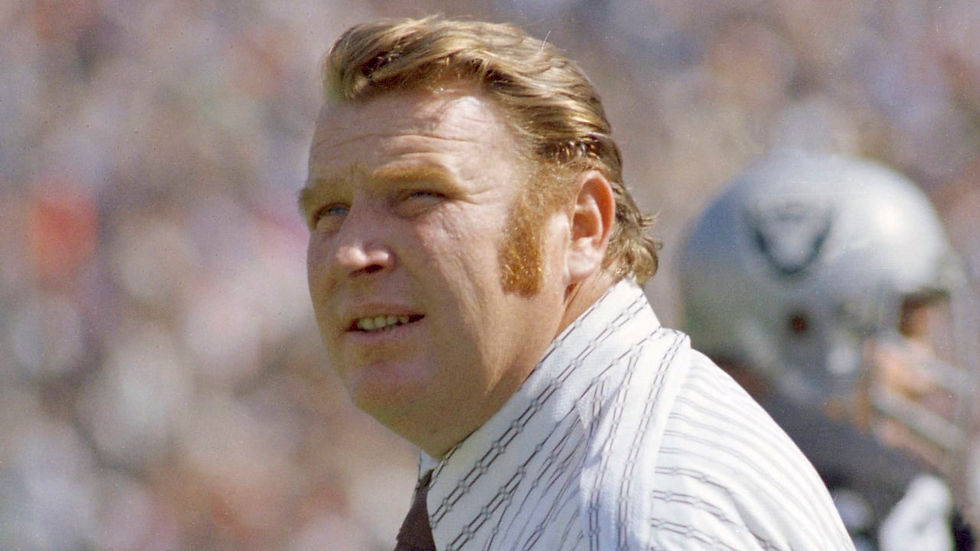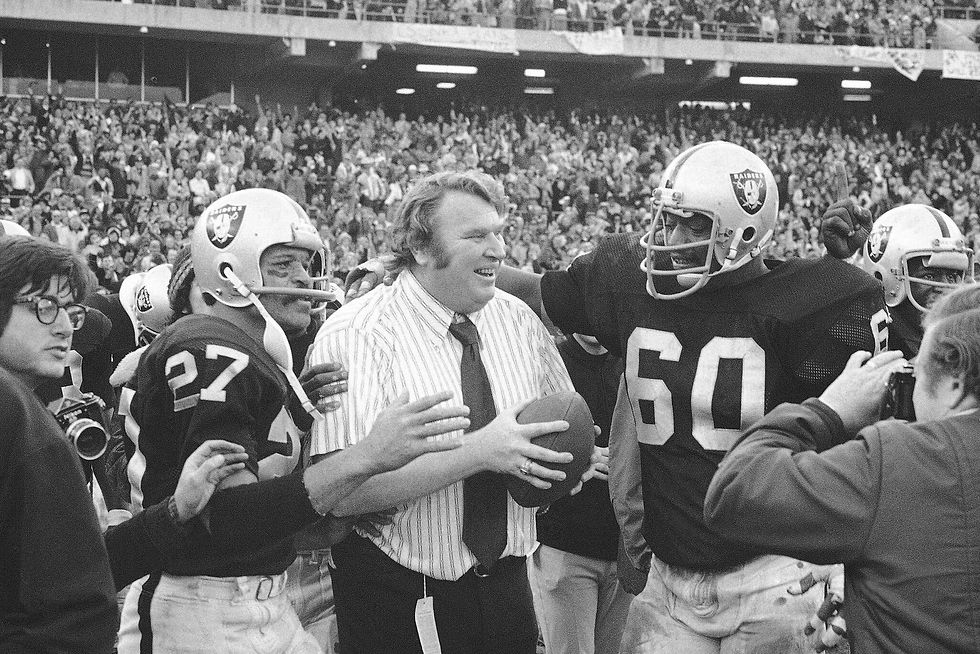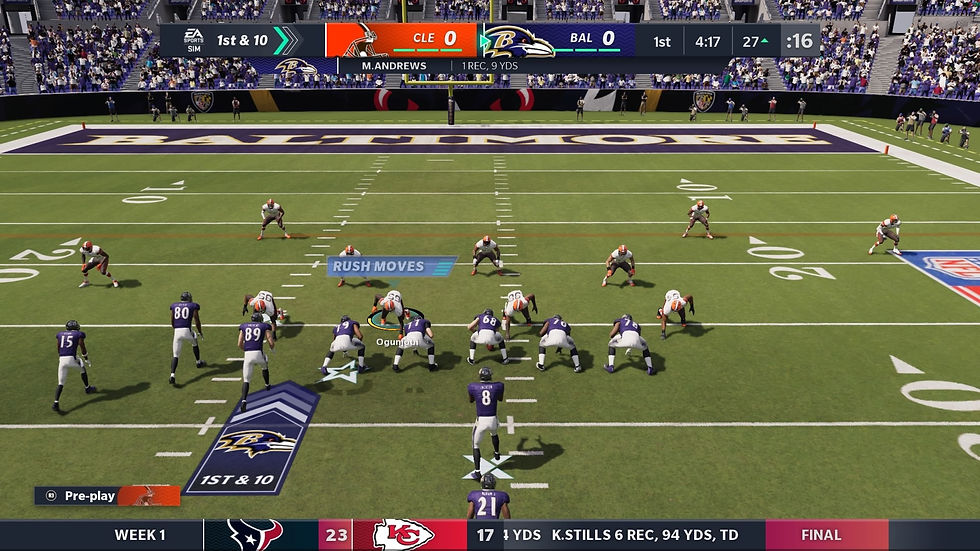John Madden: A Timeless Legend
- Kyle Park

- Jan 4, 2022
- 4 min read
Updated: Jul 30, 2022
“Nobody loved football more than Coach. He was football. He was an incredible sounding board to me and so many others. There will never be another John Madden, and we will forever be indebted to him for all he did to make football and the NFL what it is today.” These were the words of National Football League (NFL) commissioner Roger Goodell after the football world unexpectedly lost John Madden––a Hall of Fame coach, broadcasting icon, and ubiquitous NFL ambassador. The spotlight of the recent 90-minute documentary, “All Madden,” the Minnesota native achieved one-name recognition with a legacy impacting multiple generations. Turn on your television this Sunday, and every piece of what you see and hear has been influenced by Madden. He was a larger-than-life trailblazer whose fingerprints cover the way the game is coached and communicated.
These days, sporting fans like to throw the word “influencer” around. Madden was THE “influencer,” and he never really cared about public attention. He walked his own path, and soon his way became THE way. He is loved by 10-year-olds who spend their free time with an Xbox controller in their hands, 30-year-olds who remember his bombastic broadcasting style and comical “Boom!” or “Doink!” calls out of nowhere, and 70-year-olds who can recall every detail of the “Holy Roller” game that not only delivered a win for Madden’s Las Vegas Raiders but made an apoplectic Bill King make one of the most memorable calls on Raiders radio––if you have a minute to spare, please YouTube that.
Madden’s journey started when he played football for California Polytechnic University. He was an offensive lineman with serious potential. He was an imposing 6-foot-4-inch, 260-pound athlete who ran with the running backs during practice; for those unfamiliar with football, offensive linemen don’t typically do that. Earning all-conference honors at offensive tackle, Madden was drafted in the 21st-round by the NFL's Philadelphia Eagles in 1958. Unfortunately, Madden suffered a career-ending knee injury before ever taking the field. As it happened, his loss was our gain, as Madden transitioned from trying to play the game he loved to mastering how to teach it.
Madden’s coaching career began in 1960 at Allan Hancock College in Santa Maria, California, and within a few years, he was the head coach of the NFL’s renegade Oakland Raiders. During his decade-long stint with the Raiders, Madden amassed a 103-32-7 regular-season record, making it to seven American Football Conference (AFC) title games and winning the team’s first Super Bowl in 1977. His .759 winning percentage is the highest in NFL history for a coach with at least 100 wins. Madden was the people’s coach, improbably leading a collection of steeled misfits and castoffs to victory with flair. The mixture of size and charisma made Madden an intriguing character on the sideline: the tie of a salesman, the humor of a class clown, the passion of a football coach. He made legends from an era of toughness––the likes of Ken Stabler, Gene Upshaw, Jack Tatum, Jim Otto, and Fred Biletnikoff––run through a wall for him, and it took a special perspective to lead a group of football marauders for rampant success. At the same time, Madden had the joy of a kid who was immersed in a game he loved. He was as known for his easy smile and folksy ways as he was for his intensity (former players often described Madden as somebody so fiery that he could blast a rocket into space when he exploded). Even when Madden’s Raiders lost five AFC Championship Games in seven years, his voluble mountain of energy allowed the Raiders to eventually break through during the 1976 campaign, defeating the Pittsburgh Steelers in the conference title game and thrashing the Minnesota Vikings for the crown. Madden instilled a winning mentality in Oakland sports and integrated a culture of going all the way. But it was his career after coaching that solidified his iconic status in the annals of American sports and pop culture.
From 1979 to 2009, Madden was the preeminent television sports analyst, winning an unprecedented 16 Emmy Awards for Outstanding Sports Analyst and covering 11 Super Bowls, one of the greatest sports broadcasting responsibilities in the world. Emerging as a transformative figure whose frantic gesticulations and playfulness––“Turducken,” anyone?––set a new gold standard in the broadcasting booth. Madden’s sideline demeanor offered a comic relief, and his unpretentious style was refreshing in a sporting era focused on enormous wages and headline-seeking superstars. Above all, Madden truly cared about educating a football nation with his passion and digestible vernacular. With his use of the telestrator on broadcasts, Madden started marking up the screen to show viewers what the teams were attempting to do and why certain tactics did or did not work. His willingness to communicate such a complex sport in down-to-earth terms is a testament to Madden’s greatness.
In fact, the way he married the fury and fun of football through a gaming empire attracted a whole generation of pupils. The Madden video game went beyond expectations. With the help of Trip Hawkins, founder of Electronic Arts, Madden envisioned a game that would give everyone an opportunity to become sophisticated play callers. Though Madden knew little about the gaming industry, he viewed the video game proposal as an innovative coaching tool and a platform for football enthusiasts to unite. For both couch potatoes and NFL athletes, “Madden NFL”—a franchise worth approximately $4 billion going on its 41st edition—is still the go-to video game.
It’s an anomaly when a special personality translates across generations and cultures. It takes a different breed to go from assistant coach at a small community college to one of the most successful head coaches in NFL history to iconic commentator to titan of the gaming industry. Madden didn’t limit himself to one category: he soared to the loftiest heights in various fields to revolutionize the sport. He was a coach on the playing fields, a coach in the press box, and a coach in life. Thank you, John Madden.






Comments